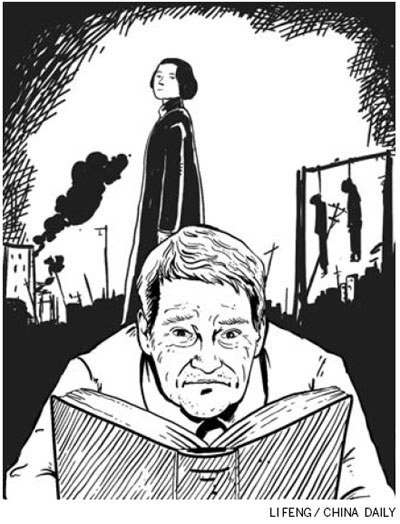Children's bright hearts might light the road to redemption
Updated: 2012-02-15 13:31
By John Clark (China Daily)
|
||||||||

I'm filled with horror and righteous indignation.
Why?
I've just read The Flowers of War by Geling Yan. It's a work of fiction based on the events that followed the Japanese army's occupation of Nanjing in December 1937.
It is the book behind Zhang Yimou's epic film, starring Hollywood actor Christian Bale.
The novel is a harrowing tale told through the eyes of a 13-year-old schoolgirl and two Chinese soldiers.
The Japanese invaders poured through the streets of Nanjing, raping and pillaging.
Chinese army units vastly outnumbered the invaders.
But communications were chaotic.
Orders were often confused and contradictory. Many officers abandoned their men. The Japanese leafleted starving Chinese forces offering food, shelter and safety. Thousands surrendered and were massacred by the Japanese.
This much we know.
Chinese commentators maintain the Japanese butchered 300,000 civilians and soldiers. The Japanese admit there were victims but deny wholesale slaughter. In 1997, 60 years after the events, the Japanese government apologized for what happened in Nanjing.
I read Iris Chang's book, The Rape of Nanking, subtitled the Forgotten Holocaust of World War II.
It is deeply disturbing. The atrocities, as described by Chang, are bestial. The torture, rape and murder of Chinese women and girls were barbaric.
Chang recounts the story of two Japanese officers who held a competition to see who could behead the most Chinese with their swords.
Chang said: "Strongly motivating me throughout this long and difficult labor (writing her book) was the stubborn refusal of many prominent Japanese politicians, academics and industrial leaders to admit, despite overwhelming evidence, that the Nanking massacre had even happened."
The author, who suffered from depression, later committed suicide. The National Museum of China on Tian'anmen Square has photos of the bodies of victims of Japanese atrocities in Nanking. They testify to unspeakable cruelty. Women's corpses have sharp bamboo sticks stuck up their private parts.
Comparisons are odious, but the Japanese claim more than 200,000 died as a result of the Americans dropping atomic bombs on Hiroshima and Nagasaki.
The Nazis killed 6 million Jews (although Holocaust deniers would say not).
Rightly, it is a crime in Germany and many other countries to deny the events of that dark page in Germany's history.
What are we to make of man's inhumanity to man?
Iris Chang tries to fathom the Japanese attitude toward the Chinese. She analyzes the militaristic culture that was fostered in Japanese soldiers and created a total disregard for human life.
It reminded me of the Nazis' demonization of Jews.
If your enemy is portrayed as less than human, then you can wreak terrible cruelty on them with a clear conscience.
We are talking about brainwashing on a massive scale.
How could husbands, lovers, fathers, carry out such atrocities against innocent men, women and children, whether Chinese or Jewish?
It is beyond my understanding.
I know servicemen of my father's generation (he's an old soldier) can never forgive the Japanese for their cruelty to British and Allied prisoners of war.
I recall a cycling holiday in the Netherlands. My girlfriend and I stayed at bed and breakfast establishments with Dutch families.
Some assumed from my blond hair that I was German. When I said I was Scottish, their attitude changed completely from cold indifference to warm friendliness. People have long memories - at least the older generation does.
When the earthquake and tsunami hit Japan last year, a Japanese child in my wife's international school (most pupils are part-Chinese) suggested the school raise money for the victims.
The idea snowballed and Chinese children and families raised thousands of yuan for Japanese victims.
We cannot blame children for the sins of their fathers.
Perhaps through similar acts of charity by innocent children, nations with a murky past may receive redemption.

 'Taken 2' grabs movie box office crown
'Taken 2' grabs movie box office crown
 Rihanna's 'Diamonds' tops UK pop chart
Rihanna's 'Diamonds' tops UK pop chart
 Fans get look at vintage Rolling Stones
Fans get look at vintage Rolling Stones
 Celebrities attend Power of Women event
Celebrities attend Power of Women event
 Ang Lee breaks 'every rule' to make unlikely new Life of Pi film
Ang Lee breaks 'every rule' to make unlikely new Life of Pi film
 Rihanna almost thrown out of nightclub
Rihanna almost thrown out of nightclub
 'Dark Knight' wins weekend box office
'Dark Knight' wins weekend box office
 'Total Recall' stars gather in Beverly Hills
'Total Recall' stars gather in Beverly Hills
Most Viewed
Editor's Picks

|

|

|

|

|

|
Today's Top News
Health new priority for quake zone
Xi meets US top military officer
Japan's boats driven out of Diaoyu
China mulls online shopping legislation
Bird flu death toll rises to 22
Putin appoints new ambassador to China
Japanese ships blocked from Diaoyu Islands
Inspired by Guan, more Chinese pick up golf
US Weekly

|

|






